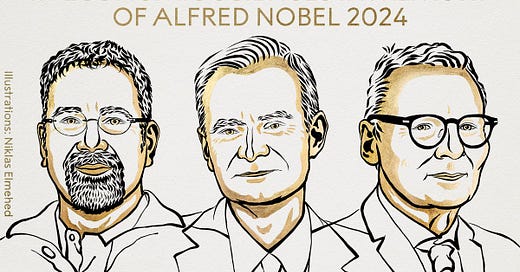Congratulations to Acemoglu, Johnson & Robinson!
How has AJR's thinking evolved? And how has it influence my own analysis?
Congratulations to Daron Acemoglu, Simon Johnson and James Robinson (AJR) for winning the Economics Nobel! This powerhouse has made a tremendous contribution, demonstrating that inclusive institutions are fundamental for long-run economic prosperity. BRAVO!
AJR are a team of inquisitive thinkers, including new work on culture. Anyone who’s listened to our many podcasts will recognise that Daron is always open to alternatives and iteratively revising his theories.
How has AJR’s thinking Evolved?
Institutions have always been primary, but their precise causal mechanisms have substantially evolved:
“Why Nations Fail” argues that self-interested elites build institutions that enable them to monopolise economic wealth and political strength. Outsiders are hobbled.
Middle Eastern and North African economies are a good example. They are segmented into insiders and outsiders. Insiders benefit from state protection, contracts, subsidies, licenses, and land. After Mubarak stepped down, politically connected firms actually suffered a loss of profits. Outsiders remain trapped in precarious employment. Economically, this retards private sector job creation, and small firms struggle to grow and remain largely family-based.
“The Narrow Corridor” suggests that for liberty and prosperity to thrive and flourish, countries must have strong states and strong societies. A strong state provides the rule of law and public goods, while a strong society exerts pressure for reform, holding the Leviathan in check.
“The Narrow Corridor” thus differs from “Why Nations Fail” in two respects:
Outsiders are not just economically and politically marginalised. They may also be socially divided - e.g. by caste or racism.
A&R also go beyond their previous focus on self-interest, to emphasise expectations. As Europeans organised petitions and secured concessions from increasingly effective states, they came to expand and demand better. Europeans came to believe in their collective efficacy. Once people were more optimistic, they were also more likely to mobilise, which in turn advanced the chances of success.
Latin America is another great example! Under authoritarian regimes, marginalised people were subjugated and routinely humiliated. Many took inequalities as inevitable. But with successful mobilisation, Latin Americans increasingly realised that they could secure political change through mass mobilisation. This culture of resistance has emboldened contemporary feminist movements.
“Power and Progress” pays more attention to prestige.
Successful individuals are revered as knowledgeable authorities and then wield tremendous capacity for ideological persuasion. Institutional persistence is thus no longer a function of rules, but of unquestioned acceptance.
A&J do not say this explicitly, but their new emphasis on unquestioned acceptance may also explain extractive institutions. Elites are not only creating market barriers, they are also widely revered!
If anyone says that AJR are ‘wrong’ because institutions don’t explain everything, then perhaps share Acemoglu and Robinson’s new paper on culture, or take a look at this:
If you are curious to learn why AJR won, here’s the scientific background.
And check out our podcasts:
Now, if you are strictly interested in AJR, please stop reading.
However, science is also a collaborative conversation, where scholars share ideas and inspire each other. Daron has in fact greatly advanced my own thinking. So I’d like to express my particular gratitude.
How Daron has advanced my analysis of “The Great Gender Divergence”
Conventional accounts of feminist progress typically emphasise female employment, feminist mobilisation, and gender equal laws. Entirely plausible.
But is it the whole story?
Here are 3 big ways Acemoglu helped me see the world differently.
1) “Reverse Dominance Coalitions”
Last year, we were discussing Christopher Boehm’s theory of ‘Reverse Dominance Hierarchies’ among hunter-gatherers. Simply, it refers to groups that collectively mock, bully, and berate those who seek to dominate. Daron then came up with an improvement, ‘Reverse Dominance Coalitions’.
What an apt way of understanding the diverse forms of feminist solidarity! It’s a big advance on ‘feminist activism’, since the overwhelming majority of women do not identify as feminists nor attend marches.
I propose that structural transformation has empowered women to build careers, forge reverse dominance coalitions, and thereby reshape public culture. This occurs in myriad spaces. Reverse dominance coalitions (RDCs) can:
Feminist friendships nurture critical reflection, helping people to question inequalities;
Reinforce righteous resistance
Build sorority and protect dissenters from bullying
Show wider support for equality and overcome despondency traps
Shift expectations that sexism will not be tolerated
Create anthems of defiance - like ‘Flowers’.
Where women are alone and unprotected, they are uniquely vulnerable to exploitation and abuse. Within homes, individuals often find themselves isolated, dependent, and crucially, lacking 'Reverse Dominance Coalition'. This asymmetry helps explain why many countries have seen rapid progress in public (female employment and leadership), yet stubbornly high rates of intimate partner abuse.

2) Prestige Bias
In “Power and Progress”, Acemoglu and Johnson advance a new theory that has been widely overlooked, yet I found immediately convincing. They emphasised prestige bias and ideological persuasion.
Culture isn’t a fossil, it’s a fist-fight. Contending coalitions are constantly vying for ideological and institutional dominance. In the past, they primarily sought conquest. But now it’s a battle for persuasion - in which prestige reigns supreme.
That’s actually my major beef with Modernisation Theory, it assumes that once people acquire a certain level of economic security then their values will invariably shift in a pre-set direction. Actually, no. We are far more tribal, we pay close attention to what our peers respect and revere.
Humans’ evolved culture of food-sharing may explain our unique norms of cooperation and conformity. Eager for status and social inclusion, we seek guidance from those who’ve achieved success, looking to emulate their paths to prosperity and social approval. This creates a dynamic where the accomplished influence others, often reinforcing their own status.
Fans of Joel Mokyr’s “Enlightened Economy” will recall his vivid portrayal of Enlightenment-era Britain: scientists and inventors thronged together to celebrate technological advances, encouraging experimentation with adulation. Textual analysis backs this up: from the 17th Century, English texts increasingly emphasised scientific, secular progress.
Prestige is thus enormously powerful, especially in concert with technology! As I’ve previously written, 20th century advances in technology and communications enabled people in peripheral places to learn from their heroes - whether that is Hollywood or Mecca. Just last week in Malaysia, two young women told me that their favourite show is “Emily in Paris”.
Icymi, this show centres on a young woman who is beautiful, stylish, and entirely autonomous . When Emily’s long-term boyfriend tells her to return to the US, she breaks it off. If men act as tedious bores or unwanted snobs, they are rejected. Sharply departing with Confucian ideals of female self-sacrifice, every storyline revolves around ‘Emily in Paris’.
Charismatic progressive TV is a seriously under-rated driver of gender equality. “Friends” is another global hit, watched by millions. Beautiful, charming and funny characters treated each other as free-thinking equals.
Just as East Asian countries adopted technologies from the frontier and leapfrogged up the value chain, so too can the world’s women watch films at the ‘culturally egalitarian frontier’, and rapidly become more gender equal. They come to expect and demand better.
While this globally comparative analysis is very much my own, it was trigged by A&J.
3) Modern Struggles over Media Censorship
If we recognise that charismatic, prestigious media are major drivers of ideological persuasion, we must also recognise the power of institutional censorship!
That is, if culture matters, we must consider the effects of it being SILENCED.
Contrary to “Why Nations Fail”, institutional censorship isn’t just a top-down endeavour to consolidate control. In tune with their more recent embrace of ‘culture’, sometimes censorship has widespread appeal and is actually enacted by elites to satisfy the masses!
Russia isn’t a simple case of self-interested elites hobbling outsiders. Putin remains supremely popular! The annexation of Crimea triggered a groundswell of national pride. Russians saw Putin more positively, turned a blind-eye to corruption, and even became more economically optimistic. Euphoria motivated wider conformity and social policing. Seizing on geopolitical glory and newfound loyalty, Putin then tightened the screws.
While A&R’s “The Narrow Corridor” claims that ‘strong societies’ invariably push for liberty, I am actually sceptical. Through my globally comparative research, I recognise many bottom-up coalitions for censorship. Deeply-devoted religious believers have mobilised to entrench piety - in Malaysia, Saudia Arabia and Egypt. Competing for credibility, political leaders may then institutionalise censorship in order to prove their piety and garner wider legitimacy.
My point therefore is that institutions are well-worth the hype, especially if we examine connections with religion, prestige, and ideological persuasion!
AJR are not the first nor last word on institutions, but they have greatly inspired a wealth of research. If prestige bias is real, we might anticipate much more!! 😉
So I personally am deeply indebted to the AJR-Nobel powerhouse.
BRAVO!!!
Podcasts with Daron Acemoglu
Little story: after I was beaten up in Mexico, I flew to give a talk in Chicago, but was a bit shaken up so reluctant to lodge alone. James Robinson and Maria Angelica Bautista had never met me, but as a testament to their wonderful generosity, kindly let me stay at their family home. I am enormously grateful. Thank you!









